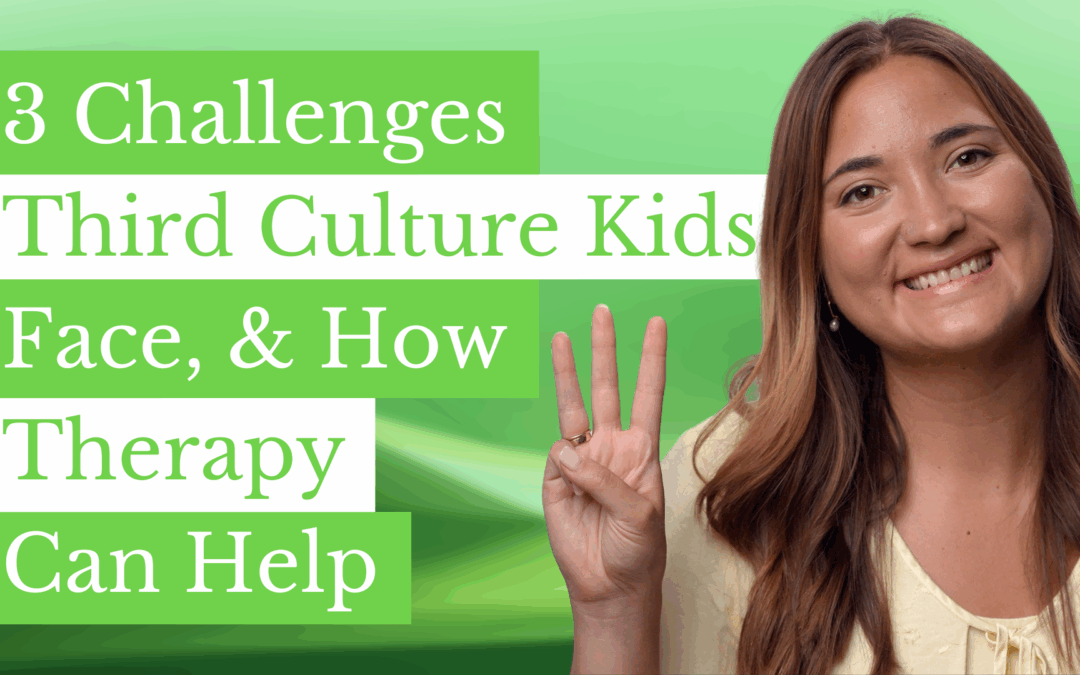Living between cultures can enrich a child’s life, but it can also quietly weigh them down.
Whether your family is overseas for military service, international business, humanitarian work, or faith-based missions, your child may be growing up as a Third Culture Kid (TCK) – someone raised in a culture outside of their parents’ passport country.
TCKs often appear resilient, adaptable, and globally aware. But underneath that strength, they may be carrying invisible burdens: feelings of grief, identity confusion, or anxiety that are hard for others to understand.
Hi, I’m Sophie Hill, a Therapist at Kid Matters Counseling. As someone who both works with globally mobile families and grew up as a TCK, I know this: TCKs face unique challenges that deserve to be seen, named, and supported.
Here are three of the most common struggles I see, and how therapy can offer a safe and healing space.
1. Chronic Loss
TCKs experience a high rate of transition and mobility in their lives. Even if they are simply transitioning between two stable locations, a passport country and host country, these frequent transitions mean repeated goodbyes to friends, familiar streets, schools, favorite foods, and even familiar languages.
While these losses may not be catastrophic, they add up over time, creating a pattern of chronic grief that often goes unrecognized.
Therapy gives TCKs a consistent space to name and process these losses. Whether through storytelling, art, or play, children can externalize their experiences and begin to make sense of the emotional impact of constant change.
2. Identity Confusion & Loneliness
As TCKs exist in between various cultural and social contexts, they often go through a uniquely complex process of developing their own identity. They may ask, “Where do I belong?” or, “Who really understands me?”
This in-between identity can spark questions about belonging and self-worth, especially during key developmental stages when children need stability to form their sense of self.
The process can also be particularly lonely for TCKs, as many peers in their home or passport country context may not be able to relate to the TCK’s unique experience.
In therapy, TCKs are met with empathy and understanding. Through a safe and trusting relationship, they can explore identity in a way that honors their unique story while building confidence and clarity in who they are becoming.
3. Stress of Navigating New Social Norms
Even for TCKs who spend a great deal of time revisiting their passport country, each visit can bring a host of new challenges that the child often feels unprepared for. They may struggle with re-learning social cues, language differences, or even classroom expectations.
These challenges often trigger feelings of anxiety, shame, or emotional shutdown, especially when peers and teachers assume they should “fit in.”
Child therapy provides a unique space for children to work out challenges with stress, emotional regulation and anxiety through the safe externalization of play.
Being a Third Culture Kid is a uniquely enriching experience, but it can also feel isolating and lonely. It doesn’t have to stay that way. Therapy can serve as a bridge: a safe, consistent space where your child is seen, supported, and equipped with the tools they need to thrive.
If your child is navigating the challenges of cross-cultural life, we’re here to walk alongside you. Reach out today, and let’s support them together in embracing both the beauty and complexity of living between worlds.

Sophie Hill
Child Therapist
With my extensive training and practical experience, I offer a unique blend of therapeutic techniques tailored to your child’s needs.
New Clients Call: (855) 586-1802
Current Clients: (855) 543-7687
Ask Us Anything!
We help anxious kids and frustrated parents. We serve Hinsdale & the Western Suburbs of Chicago.
Made with ♥︎ in Hinsdale, Illinois for Chicago
Built By Brand Your Practice.
Kid Matters Counseling, P.C. DISCLAIMER: This website and blog are for informational, educational and general discussion purposes only. It is understood that no guarantee or warranty arises from the information provided, discussed or commented upon in this website and blog nor does it constitute legal or other professional advice on any subject matter. Access to this website and blog is voluntary and at the sole risk of the user. If you think that you have a medical emergency (including clinical), call your doctor or 911 immediately. A licensed medical professional should be consulted for diagnosis and treatment of any and all medical conditions. While the information contained within this website and blog is periodically updated, no guarantee is given that the information provided is correct, complete, and/or up-to-date. See our complete Privacy Policy and Terms of Service.





